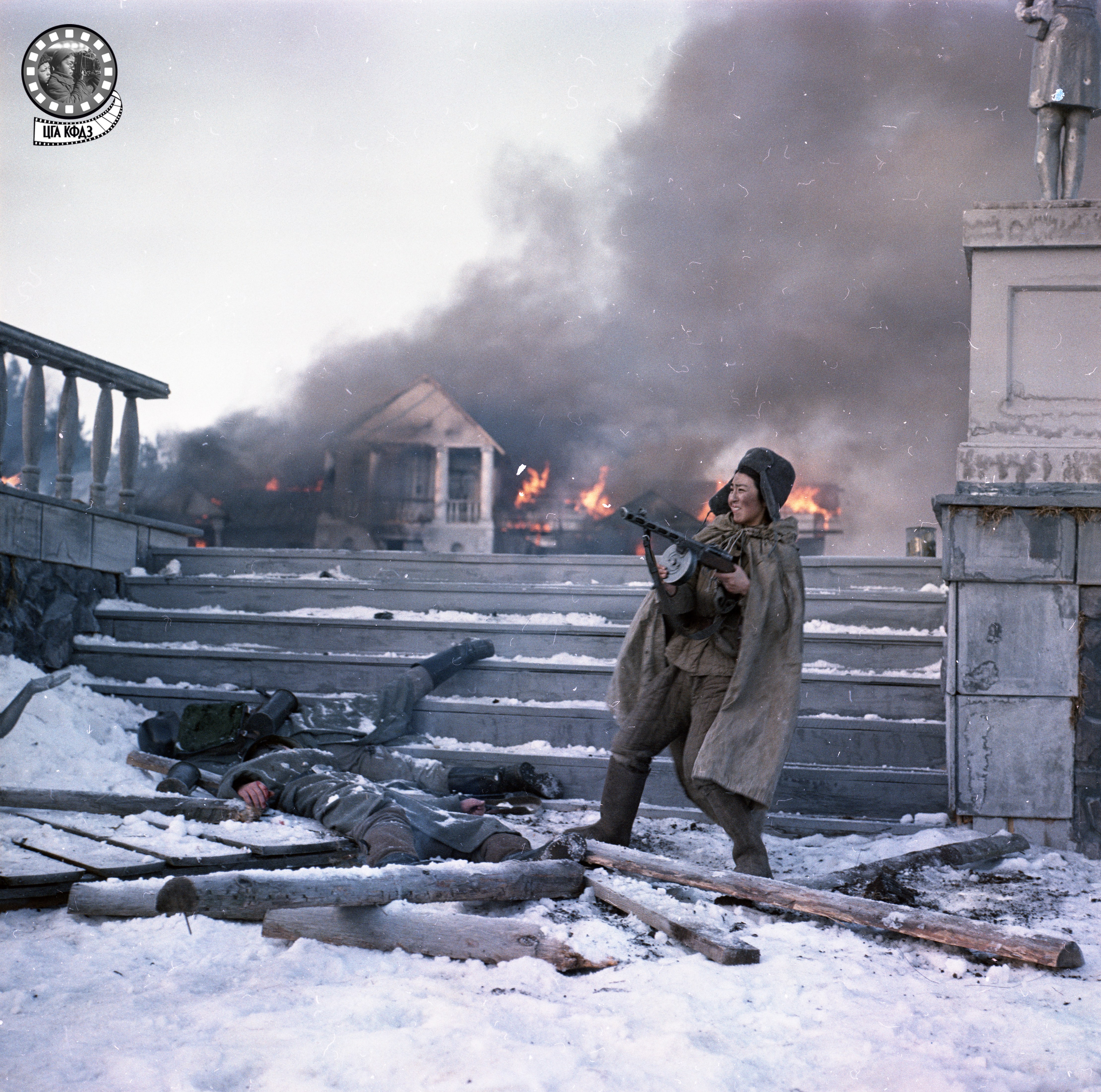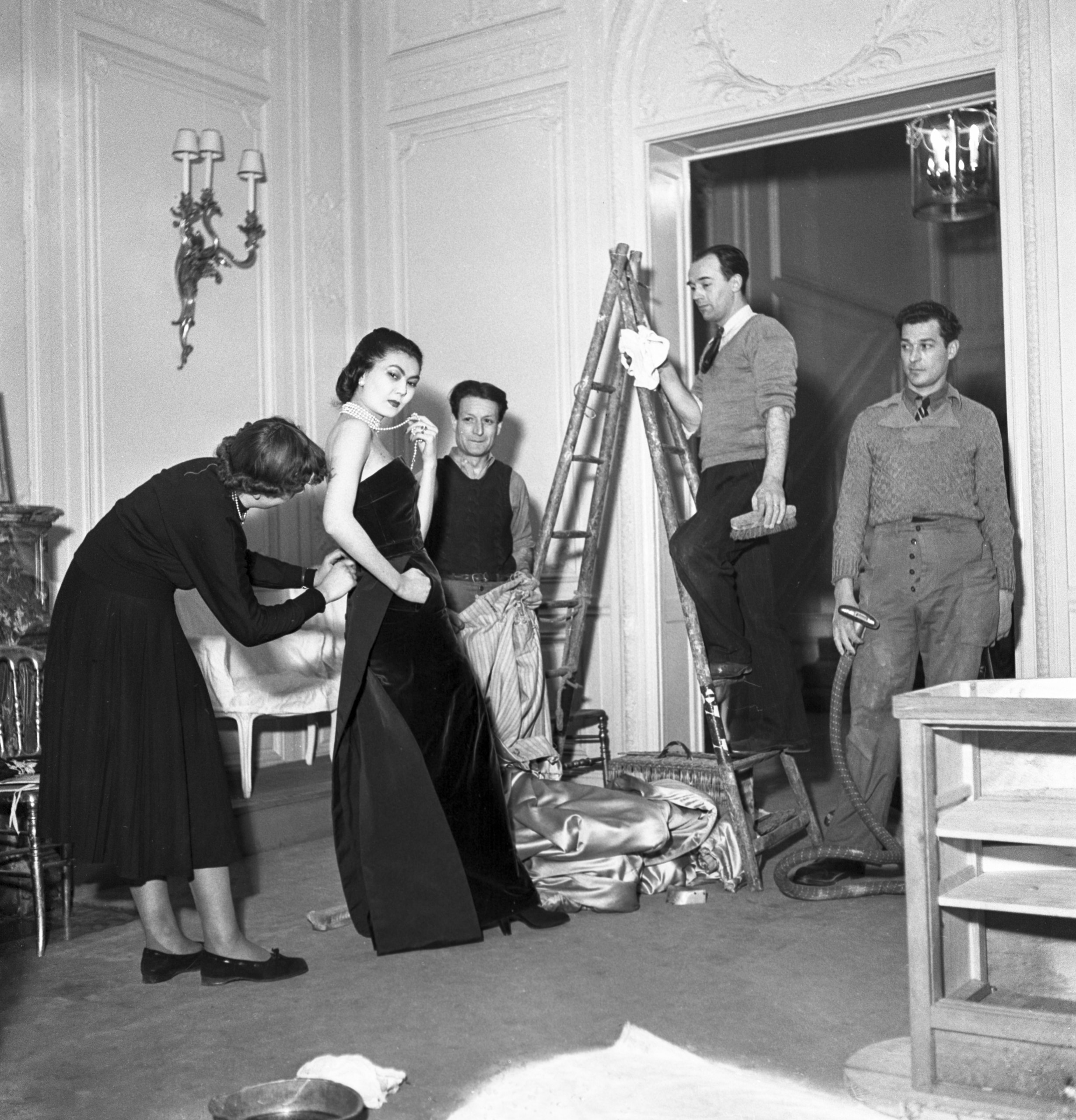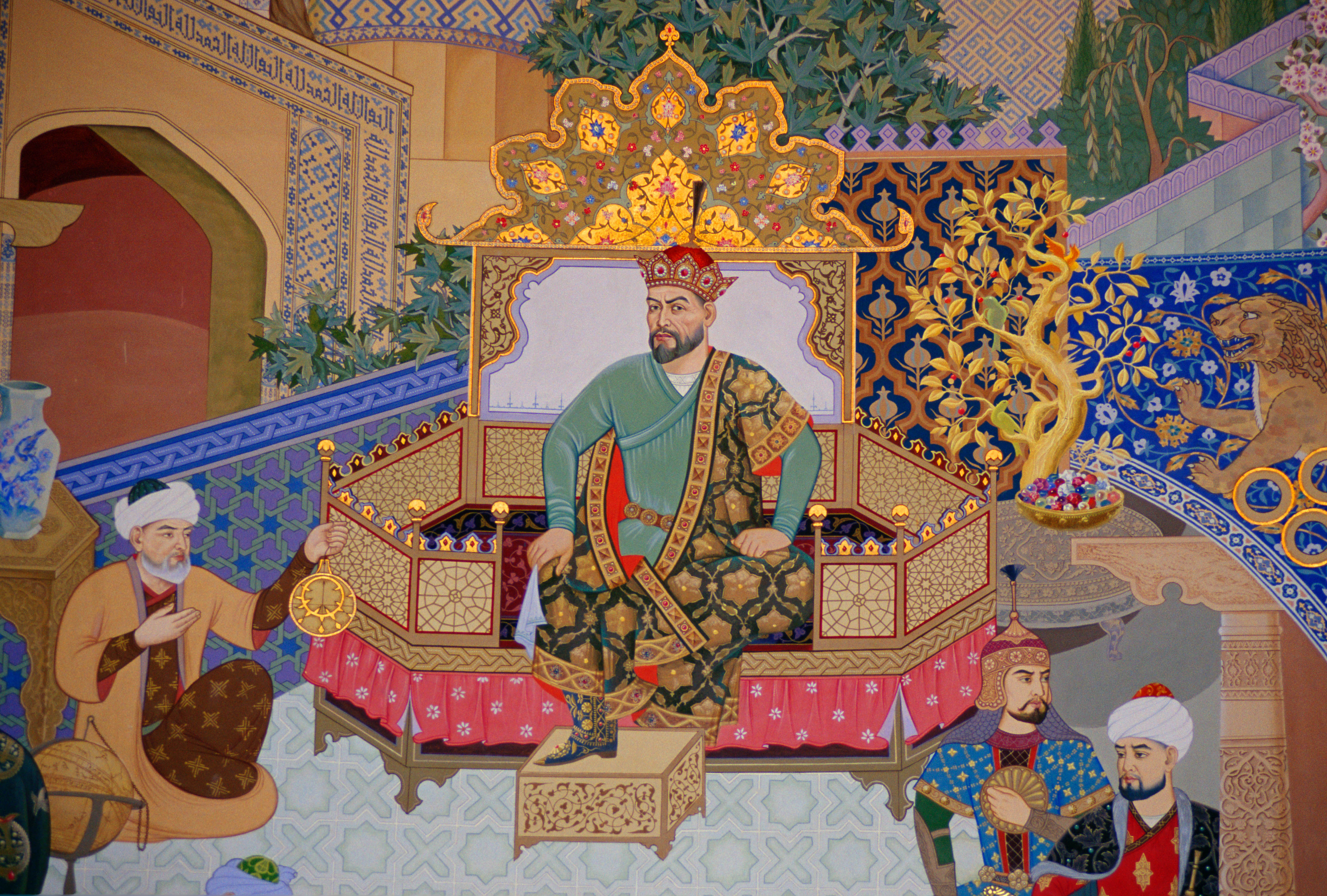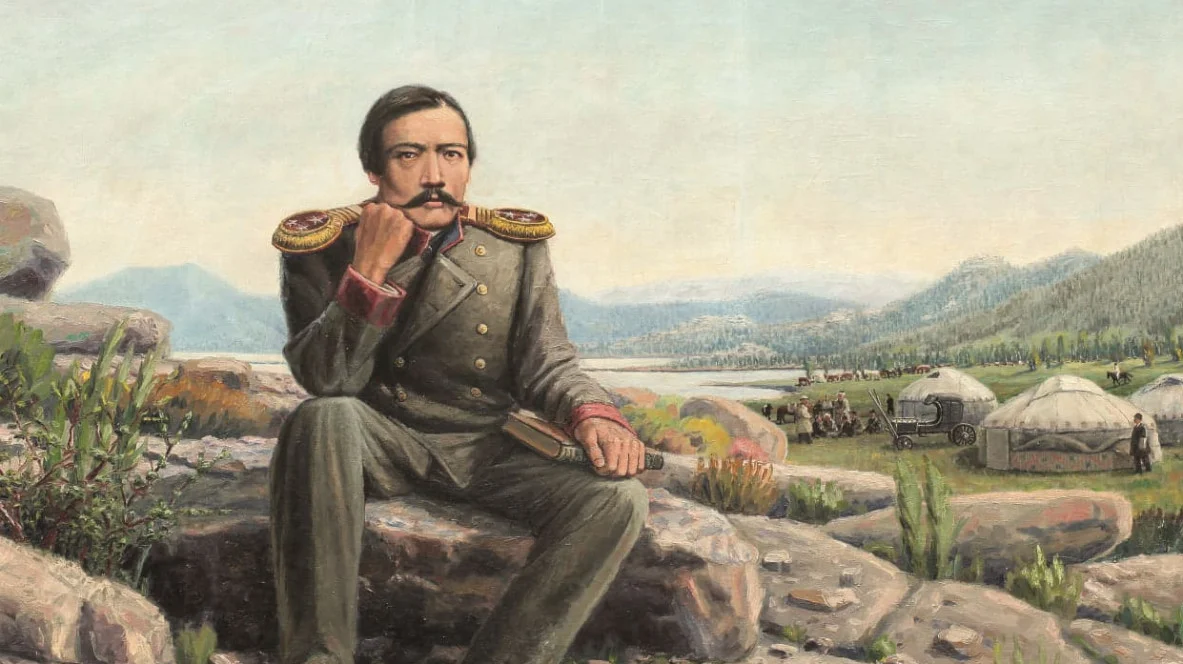
A.K.Kasteev "Portrait of Ch.Valikhanov", 1951/ A. Kasteev State Museum of Arts of the Republic of Kazakhstan
Shoqan Walikhanov’s life was quite brief, and yet he managed to leave a lasting mark on both the Kazakh and Russian nations at the same time. During his life, he traveled, stood for elections, and participated in espionage, research, and war. And even more than 150 years later, his life and legacy prompt questions that are difficult to answer.
The great-grandson of Abylai Khan and the nephew of Kenesary Kasymov, Shoqan Walikhanov was a Chingisid, a direct descendant of Jochi, the eldest son of Chinggis Khan. During his lifetime, in the middle of the nineteenth century, such an ancestry carried great weight, not just in terms of his nobility but also in terms of his influence and identity. In fact, even today, his lineage would hold significant importance.
Walikhanov was born in November 1835 in the horde wintering place of Kuntimes in the recently established Aman-Karagai district (now the village of Kuntimes in the Sarykol district of the Kostanay region). His father, Chingis Walikhanov, the senior sultan of the Aman-Karagai district of the Omsk region, usually wintered in Kuntimes.
At birth, the boy was given the name Muhammed Qanafiya, but his mother soon gave him the nickname Shoqan, which later became the name he would use.
As the son of the senior sultan, Shoqan had an idyllic childhood. Famous Kazakh singers, poets, and musicians came to visit the family all the time, and he grew up in a very creative atmosphere. He loved to listen to stories of the steppe, which he soon began to record, and this hobby quickly became a lifelong mission. Today, we know many of the stories of nomads only because Shoqan decided to write them down. A multi-talented individual, he also began to draw and turned out to be very good at it. He learned from Russian cartographers who also came to his home as guests. Although he was only a child, Shoqan liked to discuss complex historical or political topics with adults, surprising them with the rationality of his opinions and ideas.
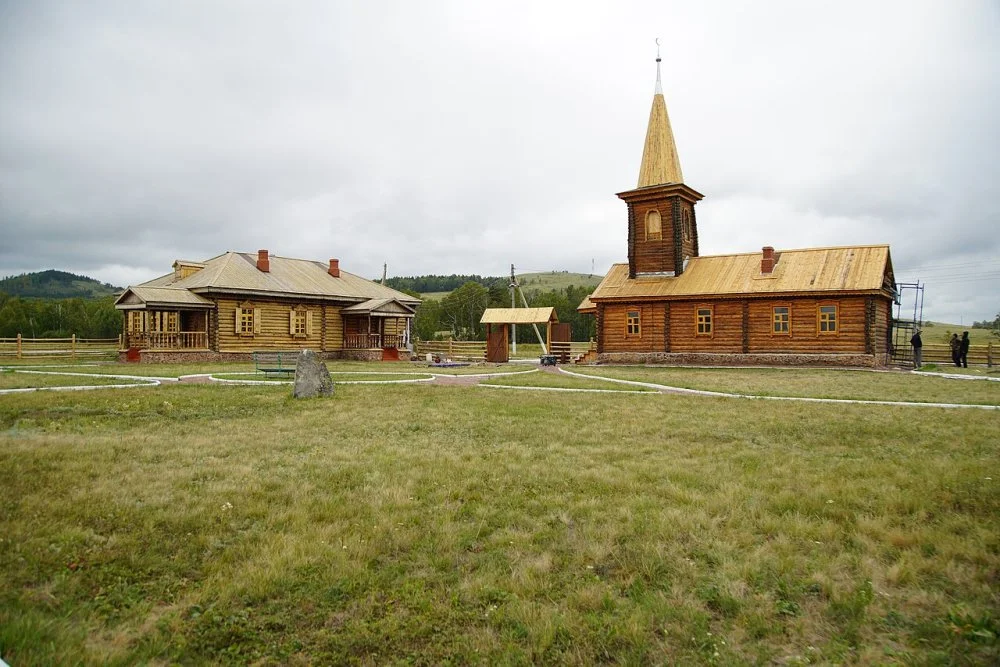
Syrymbet Manor, where Valikhanov spent his childhood and youth/ Wikimedia commons
The child’s gifts did not go unnoticed in the family, and his father decided to develop them to the greatest extent possible. The Kazakhs had long since accepted Russian citizenship and learned to take advantage of the opportunities offered by the empire. Chingis Walikhanov studied at the school of the Siberian Linear Cossack troops in Omsk. He sent his son there as well, but by that time, the school had been transformed into the Omsk Cadet Corps. This institution was known to offer the best military education in Russia outside of Moscow and St. Petersburg, making it a good choice for Shoqan’s education.
Although Shoqan had learned to speak five languages at home, Russian was not one of them, and he probably had a hard time during his first days in Omsk. It stands to reason: he was different from everyone else and nor did know the language. But this state of affairs didn’t last long. Shoqan quickly learned Russian, and the other cadets warmly welcomed him into their ranks.
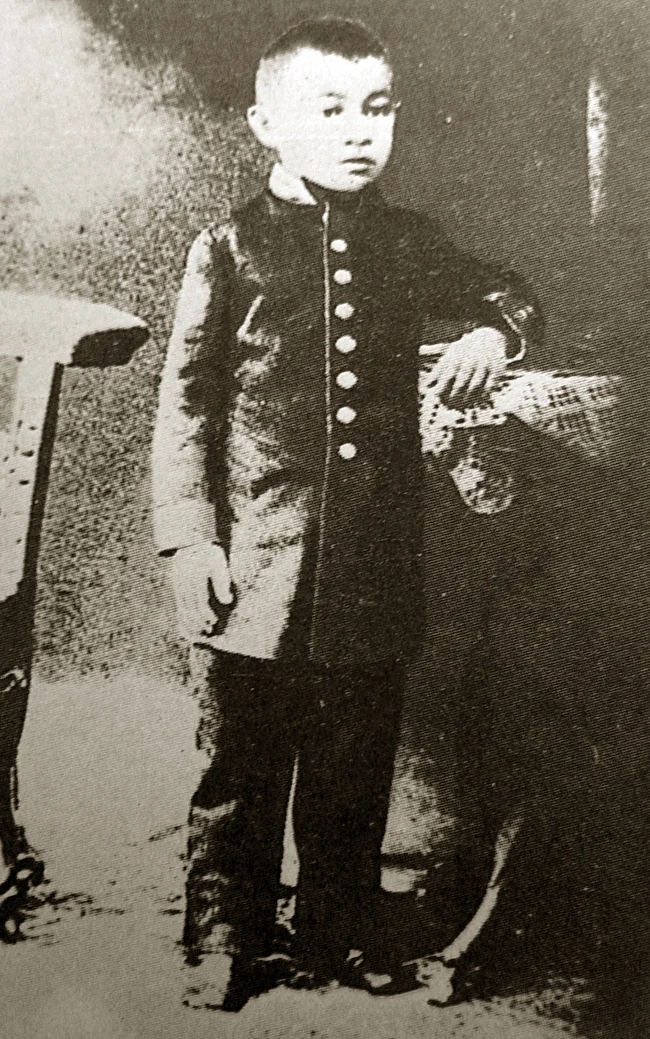
Valikhanov in 1847, when enrolling in the Omsk Military Academy / Wikipedia
The professors of the school also immediately noticed that the young cadet was talented and intelligent. In class, he became friends with Grigory Potanin, the future explorer, who later recalled:
‘Shoqan developed quickly, ahead of his Russian comrades . . . Many people were interested in him; he was so talented that he drew even before entering the institution. Shoqan was only fourteen or fifteen years old when the teachers of the corps saw him as a future explorer and perhaps a scientist.’
The Omsk Cadet Corps provided a very broad and advanced education. At that time, the Great Gamei
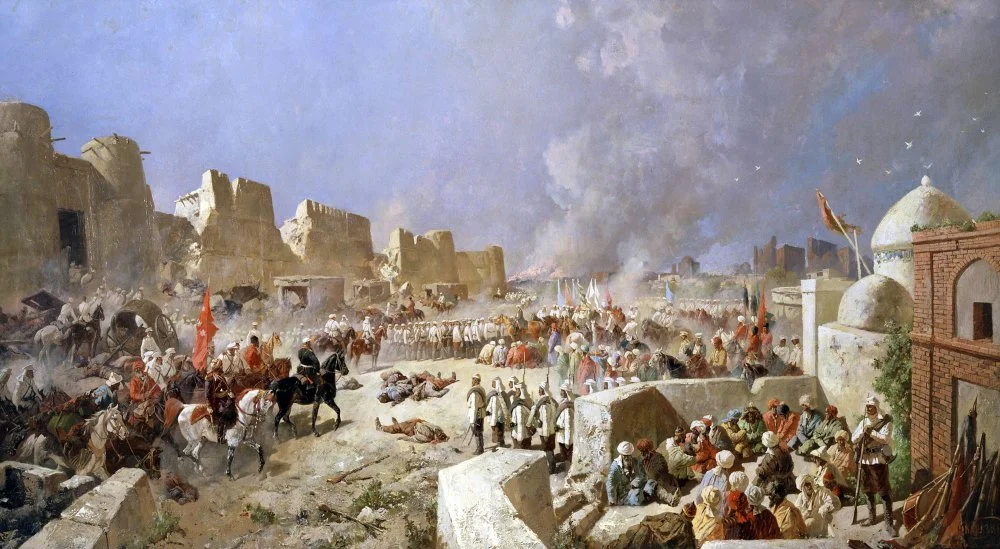
N. N. Karazin. The entry of Russian troops into Samarkand. 1888 /Alamy
Shoqan was not only able to study at the Omsk Cadet Corps but also showed his teachers many new things. He became friends with a teacher, Kostyletsky, who collected samples of steppe oral poetry. Shoqan enjoyed the same activity, and they learned a lot from each other.
In 1853, at the age of seventeen, Shoqan graduated from the Cadet Corps and was made a cornet in the army cavalry. All departments of the Russian state with interests in the newly acquired Orient wanted to hire him. However, the governor-general of Western Siberia, Gustav Gasford, pipped them all to the post, and Walikhanov was formally enrolled in the 6th Cavalry Regiment of the Siberian Cossack Troops. In reality, though, he served as the governor-general’s personal aide-de-camp.
The very next year after graduation, the young cadet found himself among the Russian intellectual elite. He met Fyodor Dostoevsky, recently released from the Omsk prison camp, and they immediately became friends.
Even though he was very young, he was already well known in Russian academic circles. For instance, Ilya Berezin, a St. Petersburg professor who needed advice on translating several medieval words in a yarlyk (decree) that Khan Tokhtamysh had given a Russian prince, contacted Shoqan for his help. The words in the decree had disappeared from the modern Tatar language, and Walikhanov himself could not translate them either. However, he learned the meaning of the words from old Kazakhs, and a spirited correspondence ensued between the professor and the aide-de-camp.
In 1855, at the age of twenty, Walikhanov went on his first scientific expedition. Together with Governor-General Gasfort, he traveled from Omsk to Semipalatinsk, from there via Ayaguz and Kapal to the foothills of the Trans-Ili Alatau, where the fort of Verny, later modern Almaty, was being built. Gasfort was very pleased with the young aide-de-camp’s achievements and gave him an award upon their return
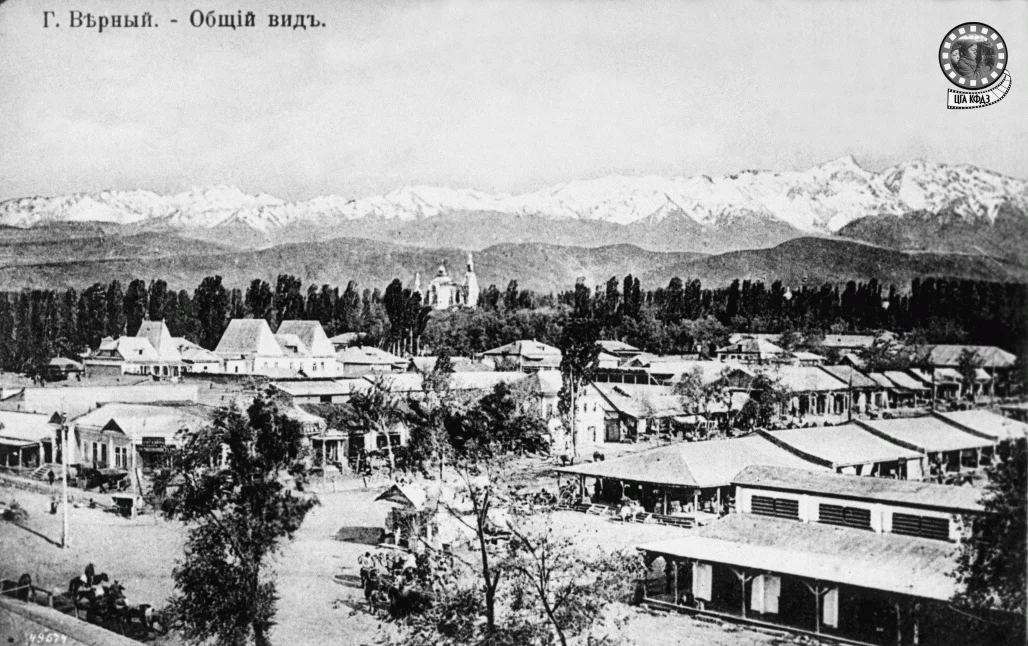
Verny city/Central State Archive of Film and Photographic Documents and Sound Recordings
The report of the governor-general stated: ‘The cornet Walikhanov, who is attached to my entourage, although not more than two years in service, has been of great use in accompanying me to the Kyrgyz steppe, knowing the needs of the service, the Kyrgyz language, and the local Kyrgyz customs.’
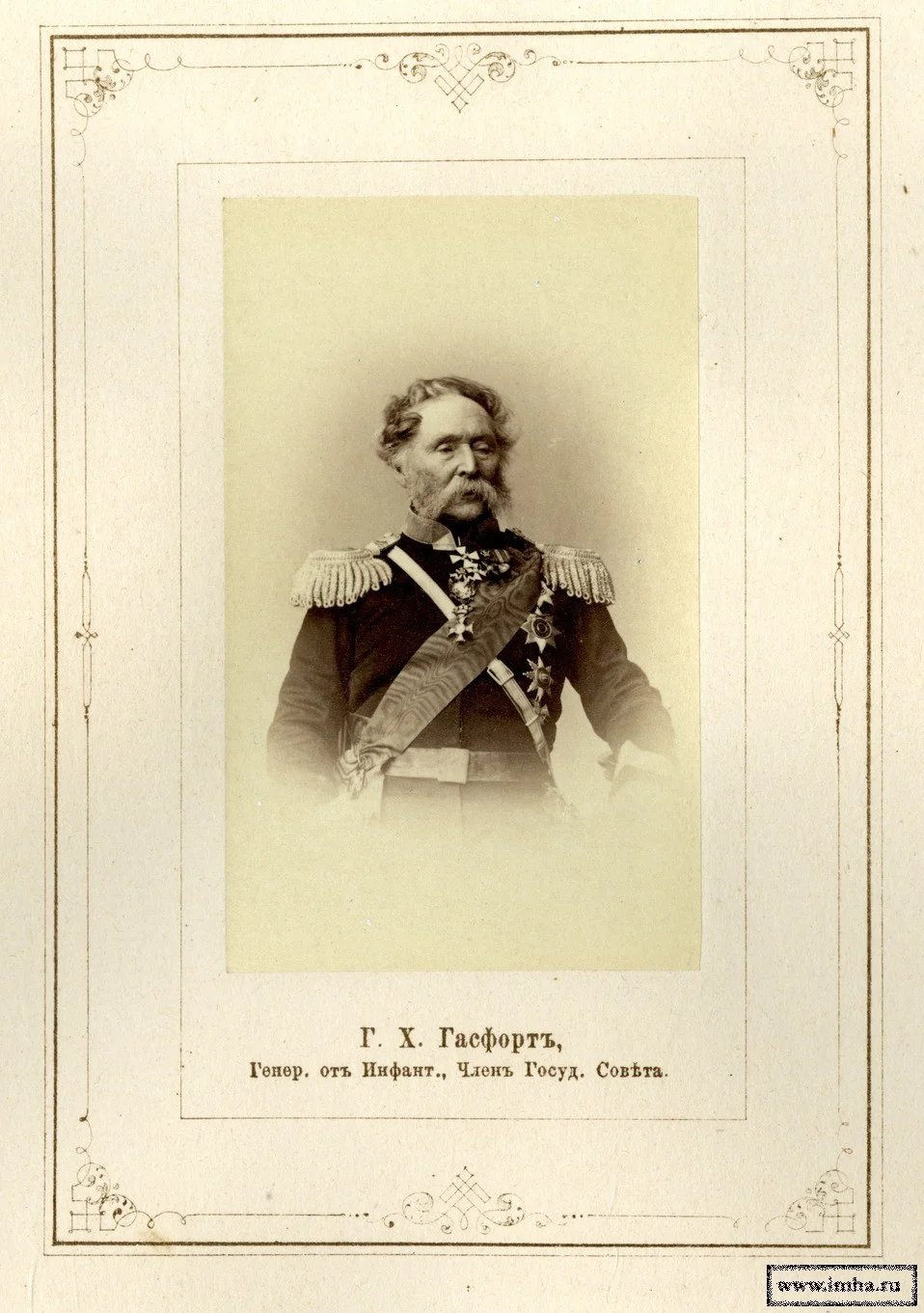
General of Infantry Gustav Christianovich Gasford. 1865/Denyer, Heinrich Johann/Wikimedia
Shoqan loved to travel, and the very next year, he went on another expedition. Under the leadership of Colonel Mikhail Khomentovsky, he traveled to the Issyk Kul Lake. For two months he lived among the Kyrgyz, collected their legends, and studied the flora and fauna of Semirechye (Jetisu). On the shores of the Issyk Kul Lake, Walikhanov found an ancient abandoned city. In Kyrgyz yurts, he became acquainted with the medieval epic Manas, wrote it down for the first time, and introduced it to the academic world in Europe.
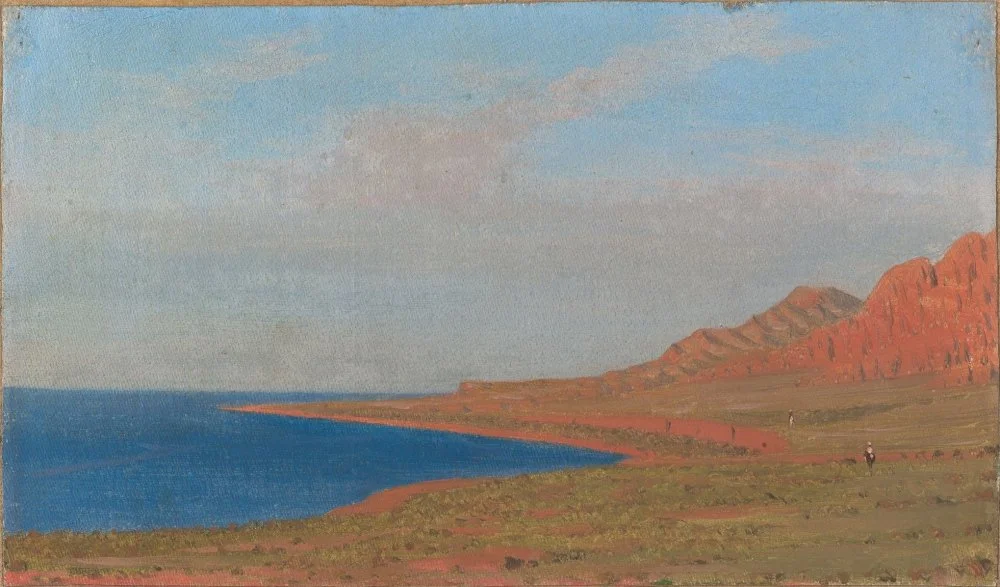
Lake Issyk-Kul by Vasily Vereshchagin, 1870/ The State Tretyakov Gallery/Wikimedia Commons
However, these wonderful activities were suddenly interrupted. The Russian government wanted to re-establish its diplomatic relations with China, which had been severed by the burning of a Russian trading station. At first, they wanted to send only the colonel as a diplomatic envoy to China, but then they decided that Lieutenant Walikhanov would do a better job. They sent for him, and Shoqan had to hurry back to Verny, and almost without stopping, he went on to Kulja (Yining). There, he successfully negotiated with the Chinese, and their neighborly relations began to improve. Later, a Russian representative office was opened in Kulja.
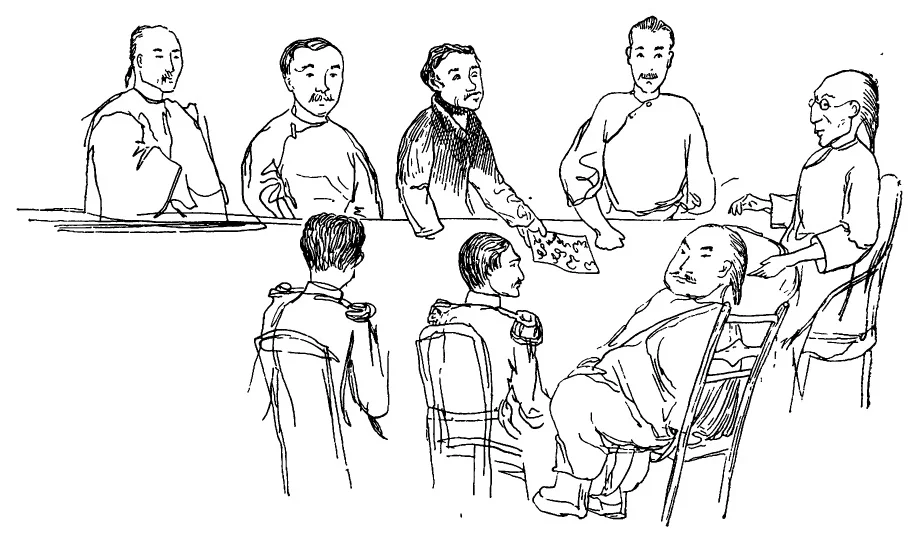
Meeting of Sh. Ch. Valikhanov and I. I. Zakharov with representatives of the Chinese government. I. I. Zakharov presents tugoldai with a diploma in the Manchurian language in 1856/Valikhanov, Ch. Ch. Selected works. — Alma-Ata, 1958/Wikimedia Commons
Walikhanov spent about three months in Kulja and then returned to Omsk. In Semipalatinsk, he was reunited with his Russian friend Dostoevsky, who was also doing well, having secured the rank of ensign in St. Petersburg. The salary allowed Ensign Dostoevsky to pursue the literary work he had long dreamed of.
Shoqan also met Pyotr Semyonov, later known as Pyotr Semyonov-Tyan-Shansky. The latter recommended the young Kazakh to the Russian Geographical Society, where he was readily accepted.
This is a photo from that time, in which both men are trying to look important. Dostoevsky, on the eve of his rise as a writer, is crumpling a cigarette, while Walikhanov, who had just joined the geographic elite of the empire, is holding a drawn dagger.
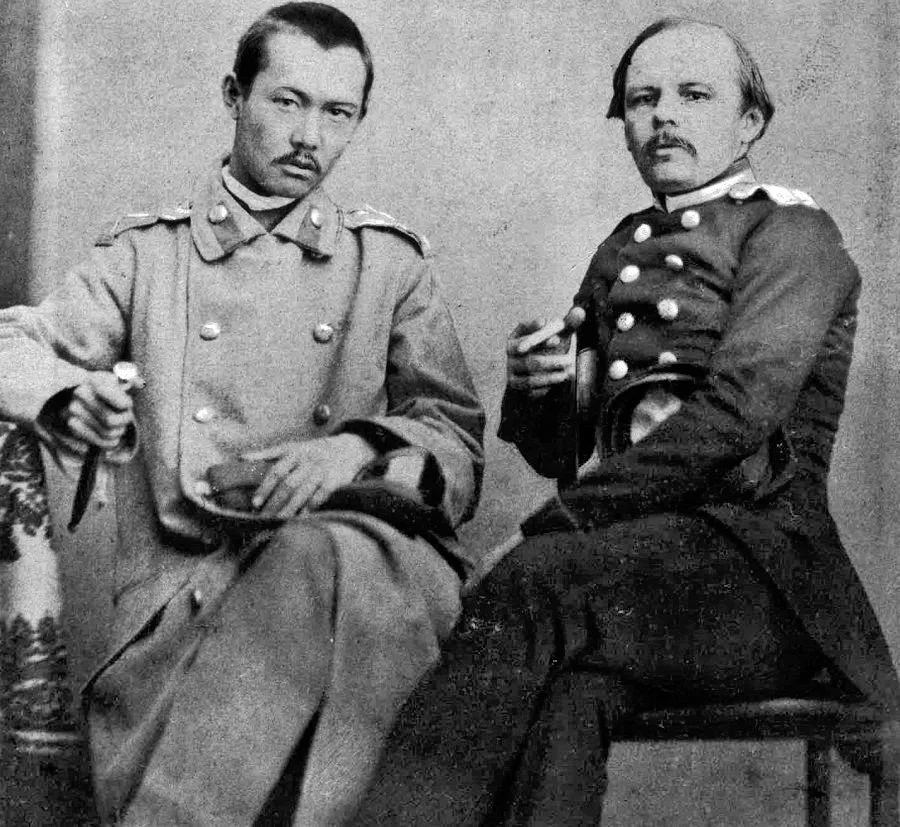
Valikhanov and Dostoevsky in Semipalatinsk. May 1859/Wikimedia Commons
But let’s leave these young men to celebrate their achievements for a moment and return to the world map. The Great Game continued to rage, and Britain had firmly established itself in India and was anxious to strengthen its northern approaches, especially to exert control over Kashgar (an area that corresponds to a part of present-day southern Xinjiang). Russia had already conquered the territory of present-day Kazakhstan and was planning further expansions, and Kashgar soon also became of interest to Russia. However, it was a Chinese province, and the last thing Beijing wanted was to cede it to the Europeans.
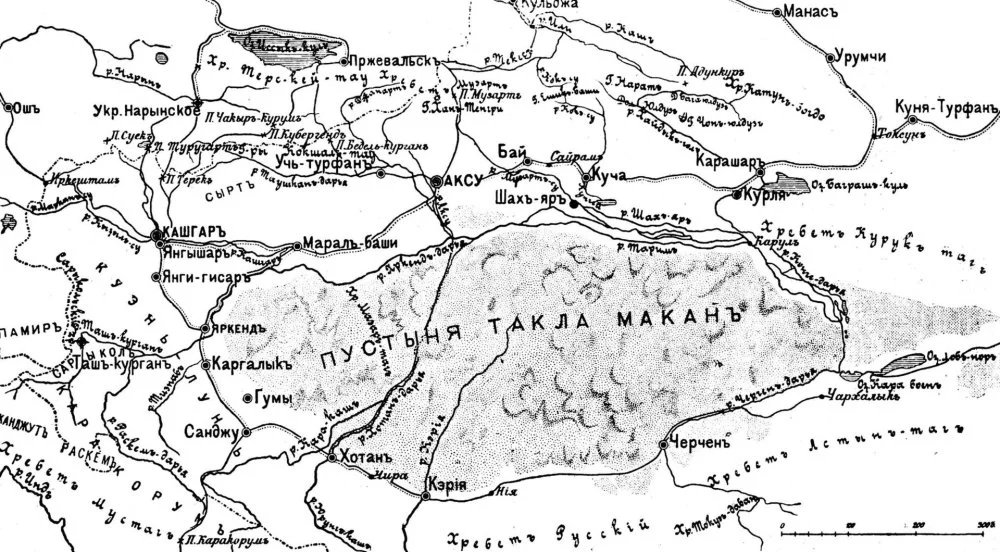
Map of Kashgar / Wikipedia
Kashgar, suddenly desired by everyone, was a place as beautiful as it was troubled. It was a fertile land in the middle of the desert that fed six cities along the Great Silk Road. In ancient times, it had been the territory of the Uyghur khaganate, but the Mongols had destroyed both the inhabitants and the irrigation during their conquest—there was nothing left. The land fell into decay, Kashgar became part of China, rebelled against it several times, and was mercilessly conquered and completely closed to European penetration.
In fact, except for Marco Polo in the distant fourteenth century, no one had ever even been there. The only thing Europeans knew about Kashgar was that it produced the best hashish in the world, and they found this extremely intriguing.
In the second half of the nineteenth century, the Qing Dynasty in China had already begun to collapse. Several uprisings broke out in Kashgar, and a certain Walikhan-ture seized power. Russia was eager to know what was going on in mysterious Kashgar and if there was a possibility of forming an alliance with someone and annexing this land.
The only way to get these answers was to go to Kashgar, and a European could not do that—they simply disappeared if they did. A year before Walikhanov undertook his journey, Adolf Schlagintweit, a German botanist-researcher, had gone to Kashgaria and disappeared without a trace. Later, Shoqan found out that on the orders of Walikhan-ture, the artist-researcher, who was not even thirty years old, was taken to the fortress wall and beheaded.
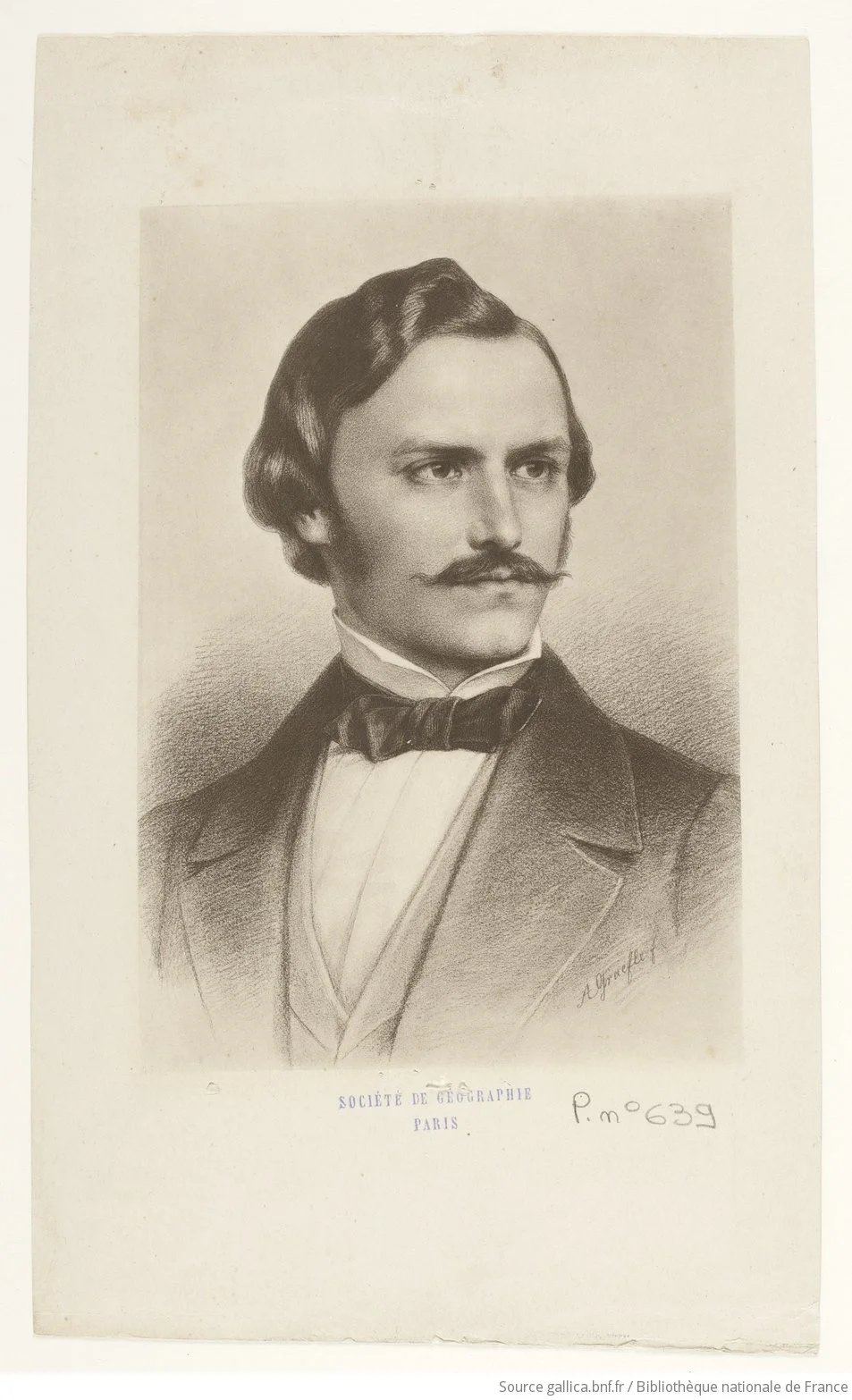
Adolf von Schlagintweit between 1800 and 1899/Julius Schlegel/BNF
And so, in the summer of 1858, Shoqan Walikhanov set out on his most dangerous and famous journey. He shaved his head and walked as part of a trading caravan to not stand out from the others.
They traversed the Tien Shan Mountains, and the crossing was not easy: some of the cattle died, and on several occasions, they only narrowly escaped attacks by mountain bandits who ambushed them in the gorges.
In Kashgaria, or the ‘Seven Cities’ as the inhabitants called their lands, Shoqan quickly grasped the political situation. Walikhan-ture, who had seized power, turned out to be a sadist, madman, and drug addict. His main occupation seemed to be chopping off the heads of anyone unfortunate enough to fall into his hands. He would order the severed heads to be piled in large heaps on the riverbank, and he liked to go and look at these piles later.
Ten years later, another Russian traveler, the famous artist Vasily Vereshchagin, would pass through these places. The stories of Walikhan-ture would inspire him to paint The Apotheosis of War. On the frame, the artist would write a dedication ‘To all great conquerors, past, present and future’, and today, everyone thinks that the painting was inspired by Timur, who was known to build towers out of heads.
Timur was infamous for building high towers out of the heads of his defeated enemies, and towards the end of his life, he even constructed minarets, or towers with an extension at the top. For this purpose, Timur’s warriors used frames, fixed the heads with cement so that they would not collapse. In general, it was a sophisticated engineering technique and far more complex than we see in the painting.
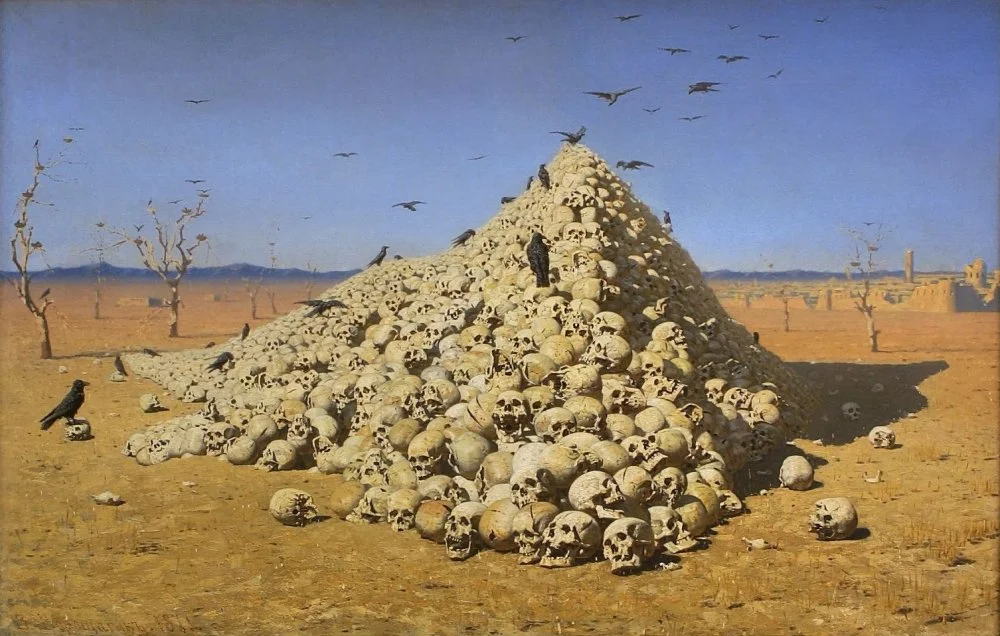
The Apotheosis of War by Vasily Vereshchagin (1871)/The State Tretyakov Gallery
Walikhan-ture, however, was no Timur. He was a perpetually intoxicated madman, as far from engineering as he was from conquest. Putting severed heads in a big pile was the height of his intellect. So while The Apotheosis of War is a monument to Walikhan-ture, it is a fact few are aware of. He was a failure in his lifetime and remained in obscurity after his death.
Shoqan Walikhanov discovered the strong influence of the Kokandans, who were from the Kokand khanate in the Fergana Valley, in the region. They were very hostile to the Russians. Somehow, they found out about Shoqan and began spreading rumors about a Russian agent who had infiltrated the city. The situation grew dangerous, and Walikhanov realized that he needed to leave Kashgar as soon as possible.
He returned to Omsk, where, in August 1859, he met Dostoevsky again. This time, the writer had good news: he had been given a temporary ticket to travel to the city of Tver. His long-awaited return from imprisonment and exile was about to begin.
Shoqan, too, was preparing for a glamorous trip to St. Petersburg, where he was persistently being summoned. Everyone was interested in the spy who had visited the once-mysterious Kashgaria. And so, Shoqan hastily finished his research, which would become the basis for the modern geography of the region, and left for the capital of the empire.
In St. Petersburg, Walikhanov caused a minor sensation. Emperor Alexander II awarded him the Order of Saint Prince Vladimir of the fourth degree, a special award for Muslims, and gave him the rank of staff rittmeister. Walikhanov was in great demand; first he worked for the General Staff, where he mapped Central Asia and East Turkestan, and from the end of May 1860, at the request of the foreign minister Prince Alexander Gorchakov (who, incidentally, was Pushkin’s school friend), he was assigned to the Asian Department of the Foreign Ministry.
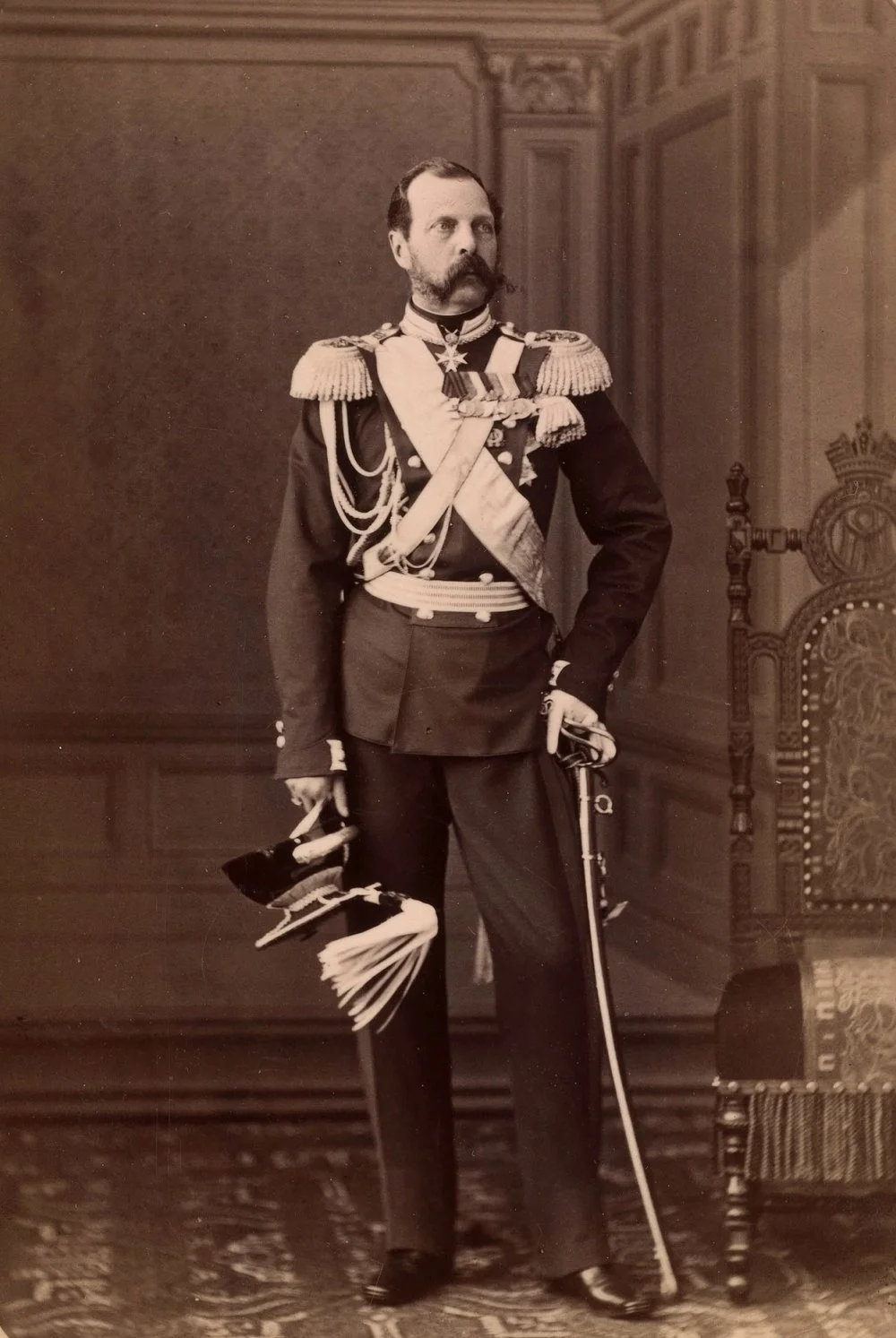
Alexander II. Photo by S. L. Levitsky between 1878 and 1879/Wikipedia
In addition to his very interesting work, Walikhanov had an extremely rich creative life in the capital. In St. Petersburg, he was reunited with Dostoevsky, who introduced him to the artistic circles of the Russian capital. He immediately became a favorite among poets and artists, and many of them later wrote poems inspired by his stories.
Shoqan published many of the stories he recorded along the way, and Europe was finally introduced to examples of steppe lore for the first time. Thus, Walikhanov was recognized by the most serious geographers in Russia.
He also came into his own at balls, where the most fashionable of St. Petersburg society gathered. There, he was respected for his wit. Shoqan began to dress exquisitely and grew a long nail on his little finger. A few decades earlier, the young Alexander Pushkin had done the same thing, and it was dandyism of the highest order.
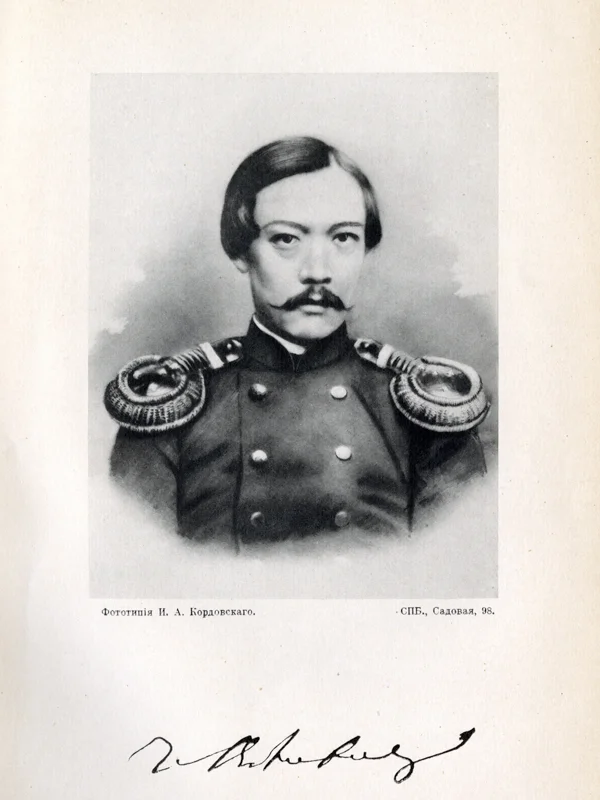
Shoqan Walikhanov/Wikipedia
But St. Petersburg was slowly killing him. Shoqan was soon diagnosed with consumption or tuberculosis. In the spring of 1861, he hurriedly left the capital and returned to his homeland, to his father’s village. Everyone was very happy to see him, and he was accommodated in a separate yurt standing at a distance. All the wise men of the steppe, musicians, singers, and experts on legends, immediately reached out to Shoqan. His yurt was always full of people and cheer.
With the help of kumis, boiled mutton, and fresh air, his illness quickly became more manageable, and Shoqan decided that the time had come to serve his people. He submitted his candidacy for the position of senior sultan of the Atbasar Okrug. He wrote to Dostoevsky:
‘I thought of becoming a sultan, somehow, in order to devote myself to benefit my compatriots, to protect them from officials and from the despotism of rich Kazakhs. At the same time, I thought that I would show my compatriots, by my example, how an educated sultan could be useful to them . . . The officials begin to stir up the egos of the rich and ambitious of the horde to frighten them: if Walikhanov becomes sultan, it will be bad for everyone; he, they say, adheres to the ideas of equality . . . They also brought into play the fact that I do not believe in God.’
The position was an elective one, but the local political actors did not expect a novelty such as real competition and were not prepared for it. In Russia, Shoqan had communicated not only with poets but also with radical youth, and his head was full of the most progressive ideas. He—a well-educated Kazakh, firmly integrated into the imperial elite—was a living symbol of the new era. And thus, the Kazakhs of the Atbasar Okrug supported him with a majority of votes despite the fierce opposition of officials and the rich.
But Shoqan was not happy for long. The governor of Western Siberia, Alexander Dugamel, refused to confirm his election, announcing that Shoqan had asked him to do so, which wasn’t the case at all. This decision and the denial of his position was a great disappointment to Shoqan.
Come to think of it, though, Governor Dugamel did everything in the only way expected of him. Russia had ruled these lands for decades—Russian officials and influential wealthy Kazakhs had built relationships, created a system of compromises, and distributed positions among themselves to make everything work. And then suddenly Shoqan burst in, waving his European ideals, and began to destroy and undermine this system. How else should the officials and the local elite have reacted?
It was also important that Shoqan Walikhanov, no matter what he thought he was, was not European. He was Kazakh, and like any Kazakh, he had many relatives, and Shoqan could not ignore their opinions in the European way. The elders of his family met with him, several unpleasant conversations ensued, and in the end Shoqan decided to give in to the governor.
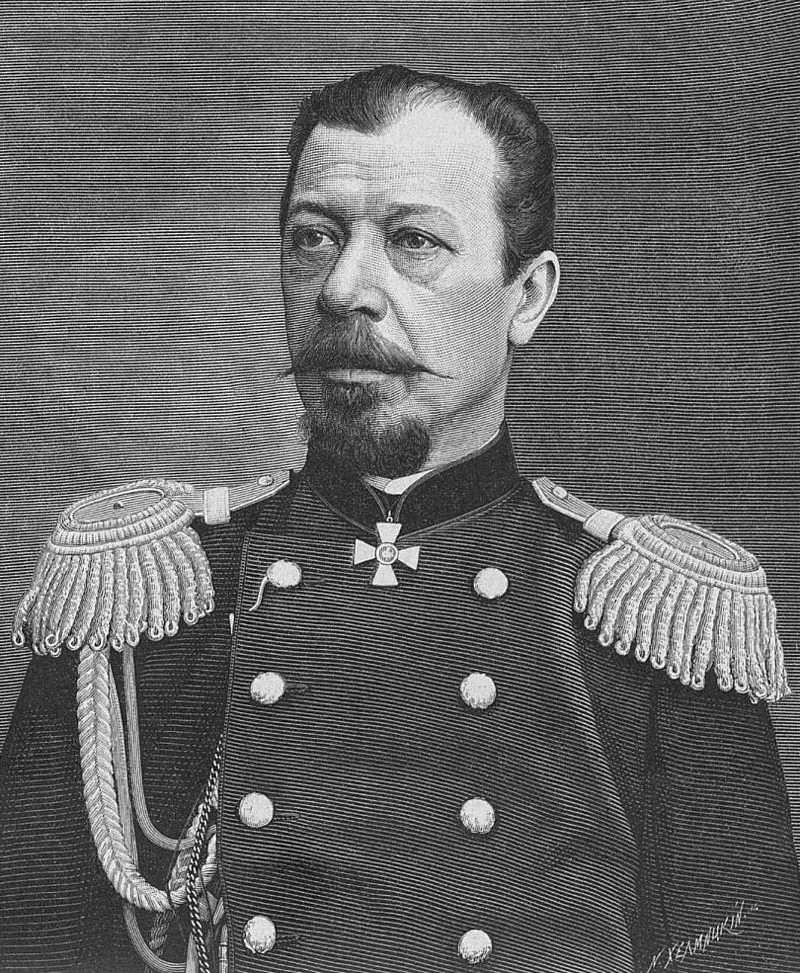
Lieutenant General Mikhail Grigoryevich Chernyaev, 1882/ Wikipedia
It’s probably a good thing it ended this way. There are precedents in history when idealists come to power, and it usually does not end well—especially for the idealists themselves.
Shoqan lived in his homeland for a while, went on more expeditions, and then left for Omsk instead of St. Petersburg, where he was always being called and where he had longed to go. Unfortunately, the climate of St. Petersburg was categorically disastrous for his health. St. Petersburg was then, along with London, the world capital of consumption: the crowded population, cold and dampness were the perfect environment for the development of this disease.
Shoqan was depressed by these developments and suddenly decided to participate in an expedition by Colonel Mikhail Chernyaev’s detachment. They were supposed to go south and take all the Kazakhs suffering from the violence of the Kokanders under imperial subjugation. Walikhanov was to negotiate to ensure a peaceful transfer of power, and he was looking forward to this task.
At first, everything went according to plan, and several Kazakh cities came over to their side. But then came the lands of Kokand, where the people hated the colonizers. Soon the fighting began, often escalating to executions. Local people died by the thousands, and not all of them were military men.
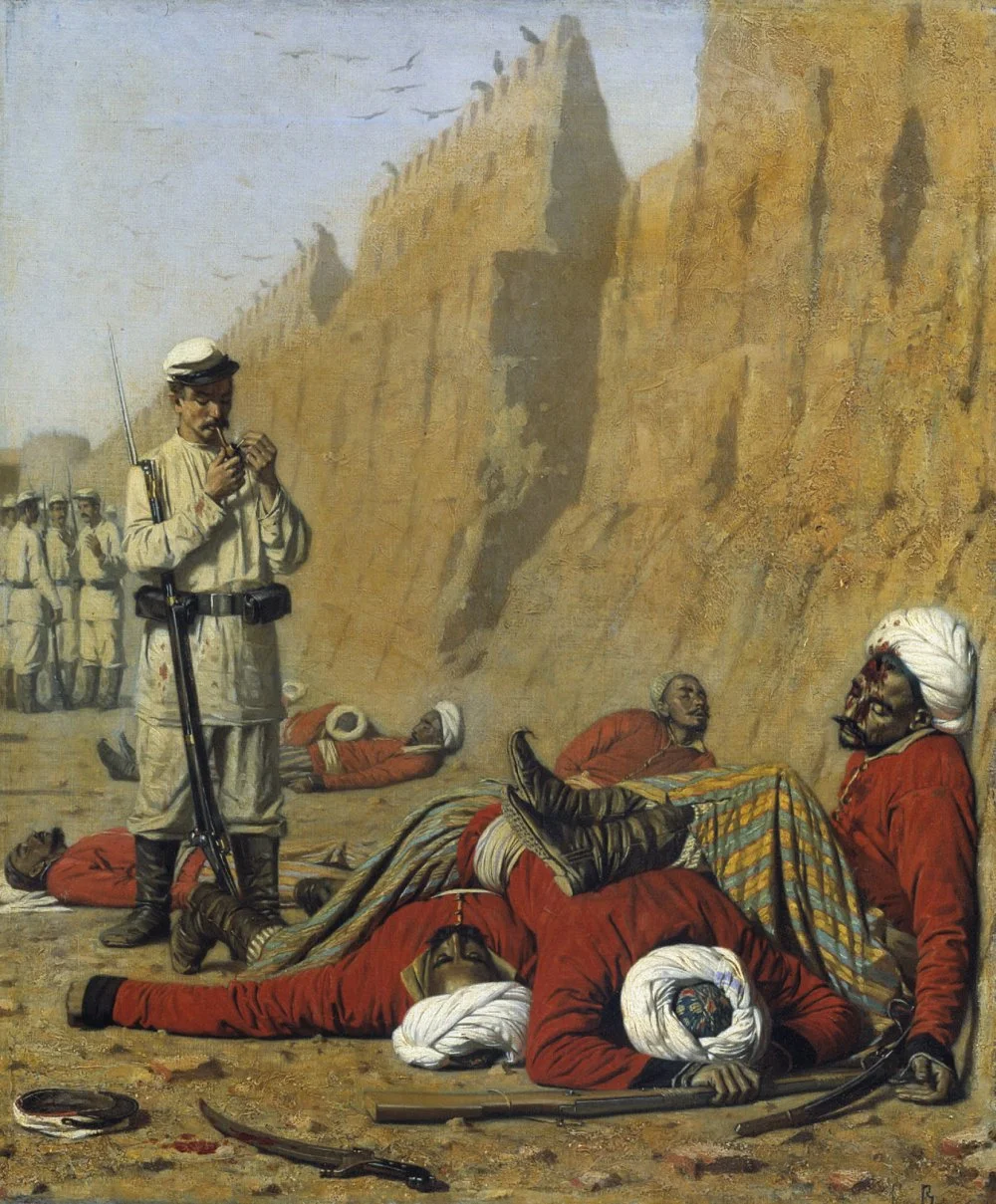
«After failure» by Vasily Vereshchagin / Alamy
For Shoqan Walikhanov, these fields, littered with people torn apart by buckshot, were a revelation. He had always been an admirer of all things European, had served the Russian Empire loyally, and had done much to further its causes. But the empire was beautiful only in the salons of St. Petersburg and in high-minded books. The real empire was what he saw in elections and on the battlefield.
This bloodshed made such an impression on Shoqan that he no longer wanted to participate in the military campaign. Along with several other officers, he left on a wagon and headed for the rear. Colonel Chernyaev continued his campaign, which would culminate in the bloody capture of Tashkent.
In the meantime, Shoqan had returned to Verny, from where he planned to go either to Omsk or to St. Petersburg. But soon, a terrible illness struck him on the way, and he was forced to stay as a guest at a relative’s house.
Soon, Major General Gerasim Kolpakovsky, the head of the Alatau Okrug and the Kazakhs of the Senior Jüz, came to their small village in person. He was interested in the staff rittmeister’s health and wanted to ask him many questions. Shoqan’s health had already significantly deteriorated by this time, and so the major general ordered him not to go anywhere and recover in his native climate. At the same time, he wanted Shoqan to monitor all diplomatic and intelligence information coming in from the Orient, an area he was very familiar with.
Soon, a Muslim rebellion broke out in the Yunnan province, and the village became a veritable intelligence center and the headquarters of several espionage operations. The last year of Shoqan’s life was as eventful as his whole life. He had time for everything. A few months before his death, he met a girl named Aysary, and they fell in love and got married.
On 10 April 1865, Shoqan Walikhanov died at the age of twenty-nine years and seven months. Soon, a marble memorial was erected there, becoming one of the most unusual monuments of the post-Soviet era. It is unique in that it survived the revolution, which few pre-revolution monuments managed to do. Although the plaque was erected in honor of a sultan and a tsarist officer, the Bolsheviks did not touch it. Moreover, soon after Stalin’s death, a granite obelisk was erected in its place. In the late 1980s, on the eve of the 150th anniversary of Shoqan’s birth, a memorial complex was built there.
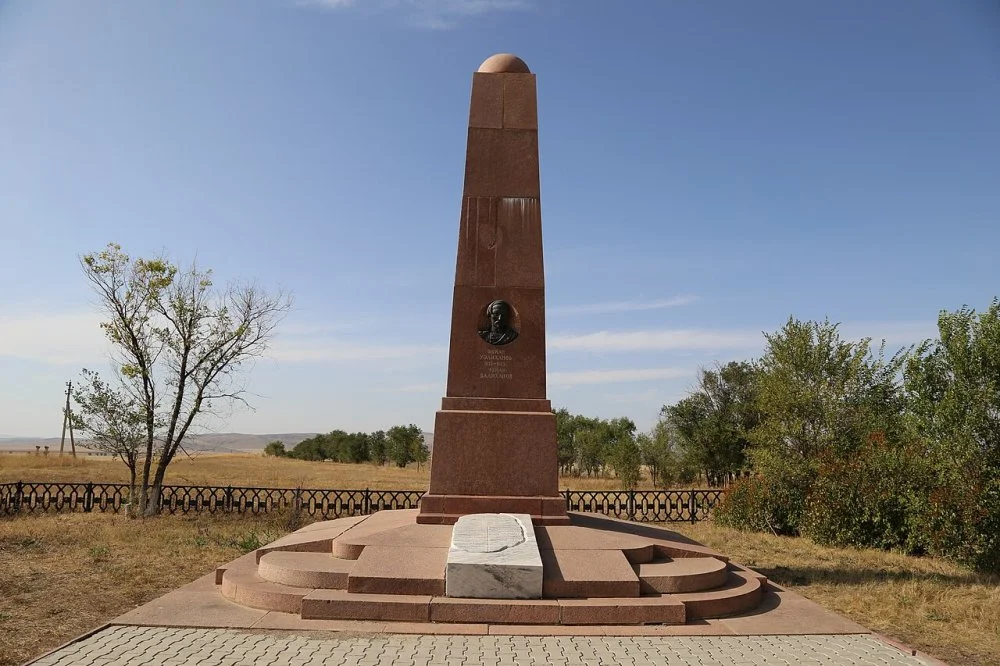
Grave of Shoqan Walikhanov/Yakov Fedorov/Wikipedia
The memory of Shoqan Walikhanov transcended class prejudices and political differences. His brilliant life was cut short so tragically early, a fact that touches everyone, no matter how they feel about Shoqan and his views. But as time goes on, the questions about Shoqan’s story only grow. There are those who see him as an imperial colonizer, a traitor to his people, even though Shoqan himself saw the empire only as a means of Europeanizing the Kazakhs and considered it an unconditional good.
Alexander Veselovsky, the eminent literary scholar, once wrote in a much-quoted letter that Shoqan Walikhanov flashed over the field of Oriental studies like a brilliant meteor. And indeed, it seems exactly that way: he flashed and then disappeared. But here is an interesting question: where would he have gone if he had not gone out?
The two main conflicts in Walikhanov’s life that are usually discussed are the ones with Governor Dugamel over his election as sultan and the one with Colonel Chernyaev over his methods of warfare. In reality, however, there were no conflicts at all. Both the governor and the colonel loved Shoqan, held him in high esteem, and spoke of him in the most glowing terms. It was just that they were both older than Shoqan, wiser than him, and understood very well what was happening to him.
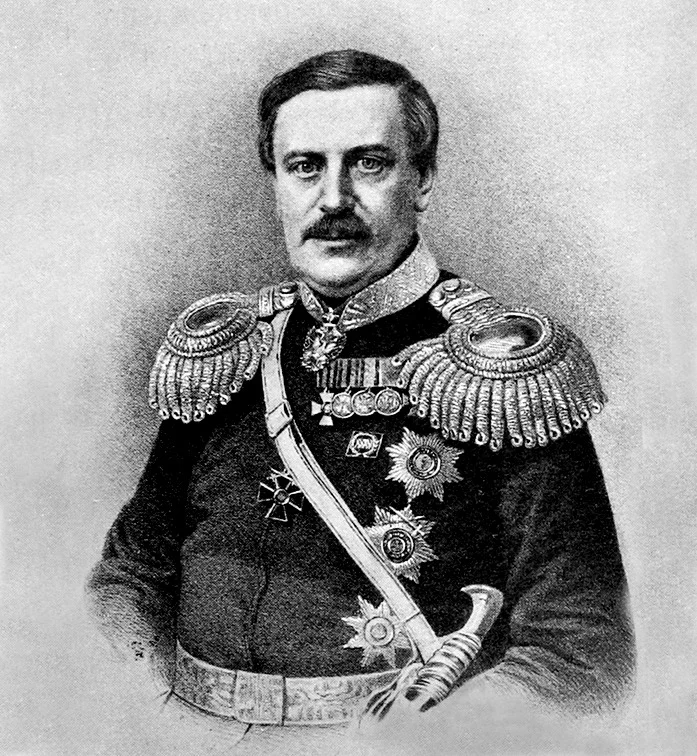
General of Infantry, Governor-General of Western Siberia Alexander Osipovich Dugamel/Wikimedia commons
What happened to him was usual for his age: his bookish ideals could not withstand their encounter with reality. Almost all intelligent people in their third decade make this sad discovery and lament the imperfections of the world. And then they find out that although everything around them is very sad, they can somehow live with it. And they start to settle down in this life . . . Shoqan simply had to grow up. The governor and the colonel were sure that he would have a glorious career in the state services after that.
But maybe they were wrong to be so sure. Maybe they shouldn’t have measured him against themselves. Maybe what he saw in the elections and in the war would later make Shoqan disillusioned with the empire. Perhaps the most interesting thing is to imagine what Shoqan Walikhanov would have been like at fifty or sixty years of age. Would he have remained true to his youthful fascination with all things European? Would he have stopped his travels, which, frankly speaking, mostly amounted to spying?
What would he do then? The only hobby that Shoqan carried with him to the end of his life, in all its childlike purity, was the search for and the recording of the oral arts of the steppes. And in the last year of his life, whenever his health and work allowed it, Shoqan met Kazakh singers and wanderers and recorded their poems and stories.
Of course, there are also conspiracy theories about his death. Some suggest that he was poisoned on orders from St. Petersburg. There are even some explanations as to why the Russians needed to kill their best expert on a region that was extremely important to Russia.
Finally, it is worth noting a famous quote by Nikolai Katanov, professor of comparative Turkic studies at Kazan University, about Shoqan Walikhanov:
‘Among the Mongolians and East Turkic peoples, three men—Dorzhi Banzarov, Shoqan Walikhanov, and myself—took the path of Oriental studies. Each of us devoted ourselves entirely to Russian literature. I renounced shamanism and became a Christian to serve their science. Shoqan and Dorzhi died of vodka before the age of thirty-five because our Russian colleagues taught us nothing except drinking.’
This is definitely not true. Yes, Walikhanov’s last letters mention that he loved champagne, but loving champagne and dying of vodka are two different things.
The professor is also wrong in another part of his statement—that the Russians taught Shoqan nothing. Shoqan Walikhanov not only came into his own in Russia but also immediately found himself among the best of his kind. They taught him everything they lived for. He became as European as the most advanced young people in the empire, sharing the same dreams of progressive reform. In both Russia and Kazakhstan, however, disappointment and defeat awaited all these young ‘Europeans’. Walikhanov’s friend Dostoevsky quickly abandoned his youthful ideas, and firmly believed in God and Russia’s special path in adulthood. Shoqan Walikhanov had just enough time to be disappointed in his youthful ideals, but he did not have time to find new landmarks for his journey.
